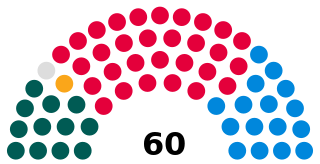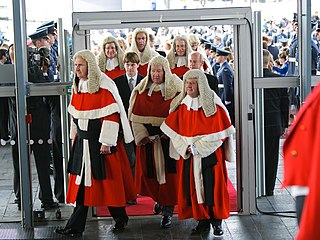
The Senedd, officially known as the Welsh Parliament in English and Senedd Cymru in Welsh, is the devolved, unicameral legislature of Wales. A democratically elected body, it makes laws for Wales, agrees to certain taxes, and scrutinises the Welsh Government. It is a bilingual institution, with both Welsh and English being the official languages of its business. From its creation in May 1999 until May 2020, the Senedd was known as the National Assembly for Wales.

The Welsh Government is the devolved government of Wales. The government consists of ministers and deputy ministers, and also of a counsel general. Ministers only attend the Cabinet Meetings of the Welsh Government. It is led by the first minister, usually the leader of the largest party in the Senedd, who selects ministers and deputy ministers with the approval of the Senedd. The government is responsible for tabling policy in devolved areas for consideration by the Senedd and implementing policy that has been approved by it.

Taxation in the United Kingdom may involve payments to at least three different levels of government: central government, devolved governments and local government. Central government revenues come primarily from income tax, National Insurance contributions, value added tax, corporation tax and fuel duty. Local government revenues come primarily from grants from central government funds, business rates in England, Council Tax and increasingly from fees and charges such as those for on-street parking. In the fiscal year 2014–15, total government revenue was forecast to be £648 billion, or 37.7 per cent of GDP, with net taxes and National Insurance contributions standing at £606 billion.
The Barnett formula is a mechanism used by the Treasury in the United Kingdom to automatically adjust the amounts of public expenditure allocated to Northern Ireland, Scotland and Wales to reflect changes in spending levels allocated to public services in England, Scotland and Wales, as appropriate. The formula applies to a large proportion, but not the whole, of the devolved governments' budgets − in 2013–14 it applied to about 85% of the Scottish Parliament's total budget.

The economy of Wales is part of the wider economy of the United Kingdom, and encompasses the production and consumption of goods, services and the supply of money in Wales.

Welsh law is an autonomous part of the English law system composed of legislation made by the Senedd. Wales is part of the legal jurisdiction of England and Wales, one of the three legal jurisdictions of the United Kingdom. However, due to devolution, the law in Wales is increasingly distinct from the law in England, since the Senedd, the devolved parliament of Wales, can legislate on non-reserved matters.

Welsh independence is the political movement advocating for Wales to become a sovereign state, independent from the United Kingdom.
Full fiscal autonomy (FFA) – also known as devolution max, devo-max, or fiscal federalism – is a particular form of far-reaching devolution proposed for Scotland and for Wales. The term has come to describe a constitutional arrangement in which instead of receiving a block grant from the UK Exchequer as at present, the Scottish Parliament or the Senedd would receive all taxation levied in Scotland or Wales; it would be responsible for most spending in Scotland or Wales but make payments to the UK government to cover Scotland or Wales's share of the cost of providing certain UK-wide services, largely defence and foreign relations. Scottish/Welsh fiscal autonomy – stopping short of full political independence – is usually promoted by advocates of a federal United Kingdom.
The Independent Commission on Funding and Finance for Wales, also known as The Holtham Commission, was established by Rhodri Morgan, Ieuan Wyn Jones and Andrew Davies, of the Welsh Assembly Government. The establishment of the Commission was a commitment in the One Wales coalition agreement between Labour and Plaid Cymru in June 2007. Based in Cathays Park, Cardiff, the Commission completed its work in July 2010, publishing its findings in a final report: Fairness and accountability: a new funding settlement for Wales.

The Office for Budget Responsibility (OBR) is a non-departmental public body funded by the UK Treasury, that the UK government established to provide independent economic forecasts and independent analysis of the public finances. It was formally created in May 2010 following the general election and was placed on a statutory footing by the Budget Responsibility and National Audit Act 2011. It is one of a growing number of official independent fiscal watchdogs around the world.
The Commission on Devolution in Wales, also known as the Silk Commission, was an independent commission established by Welsh Secretary Cheryl Gillan on 11 October 2011. The commission was based at the Wales Office Cardiff headquarters, at Cardiff Bay and met for the first time on 4 November 2011 at the Millennium Stadium, Cardiff. The commission reviewed the case for the devolution of fiscal powers to the Welsh Assembly, now the Senedd, and considered the case for increasing the powers of the assembly. It published its findings in two parts.

The Wales Act 2014 is an Act of the Parliament of the United Kingdom.
The Abolish the Welsh Assembly Party, or in Wales, simply Abolish, is a registered single issue political party in Wales. It campaigns for the abolition of the Senedd, formerly known as the "National Assembly for Wales", the devolved legislature of Wales. Abolish advocates that devolved powers be returned to the Secretary of State for Wales within the UK Central Government and the Parliament of the United Kingdom at Westminster.

The Wales Act 2017 is an Act of the Parliament of the United Kingdom. It sets out amendments to the Government of Wales Act 2006 and devolves further powers to Wales. The legislation is based on the proposals of the St David's Day Command Paper.

Taxation in Scotland today involves payments that are required to be made to three different levels of government: to the UK government, to the Scottish Government and to local government. Currently 32.4% of taxation collected in Scotland is in the form of taxes under the control of the Scottish parliament and 67.6% of all taxation collected in Scotland goes directly to the UK government in taxation that is a reserved matter of the UK parliament.

The Welsh Revenue Authority is a non-ministerial department of the Welsh Government responsible for the administration and collection of devolved taxes in Wales.

Welsh Rates of Income Tax (WRIT) is part of the UK income tax system and from 6 April 2019 a proportion of income tax paid by taxpayers living in Wales is transferred straight to the Welsh Government to fund Welsh public services. It is administered by HM Revenue and Customs (HMRC), but it is not a devolved tax comparable to Scottish income tax.

From 1999 to 2022 Wales has had a negative fiscal balance, due to public spending in Wales exceeding tax revenue. For the 2018–19 fiscal year, the fiscal deficit was about 19.4 percent of Wales's estimated GDP, compared to 2 percent for the United Kingdom as a whole. All UK nations and regions except for East, South East England and London have a deficit. Wales' fiscal deficit per capita of £4,300 is the second highest of the economic regions, after the Northern Ireland fiscal deficit, which is nearly £5,000 per capita.

Welsh devolution is the transfer of legislative power for self-governance to Wales by the Government of the United Kingdom.
There have been calls for further Welsh devolution and autonomy for Wales since the Welsh legislature of the Senedd was founded following the 1997 Welsh devolution referendum.














